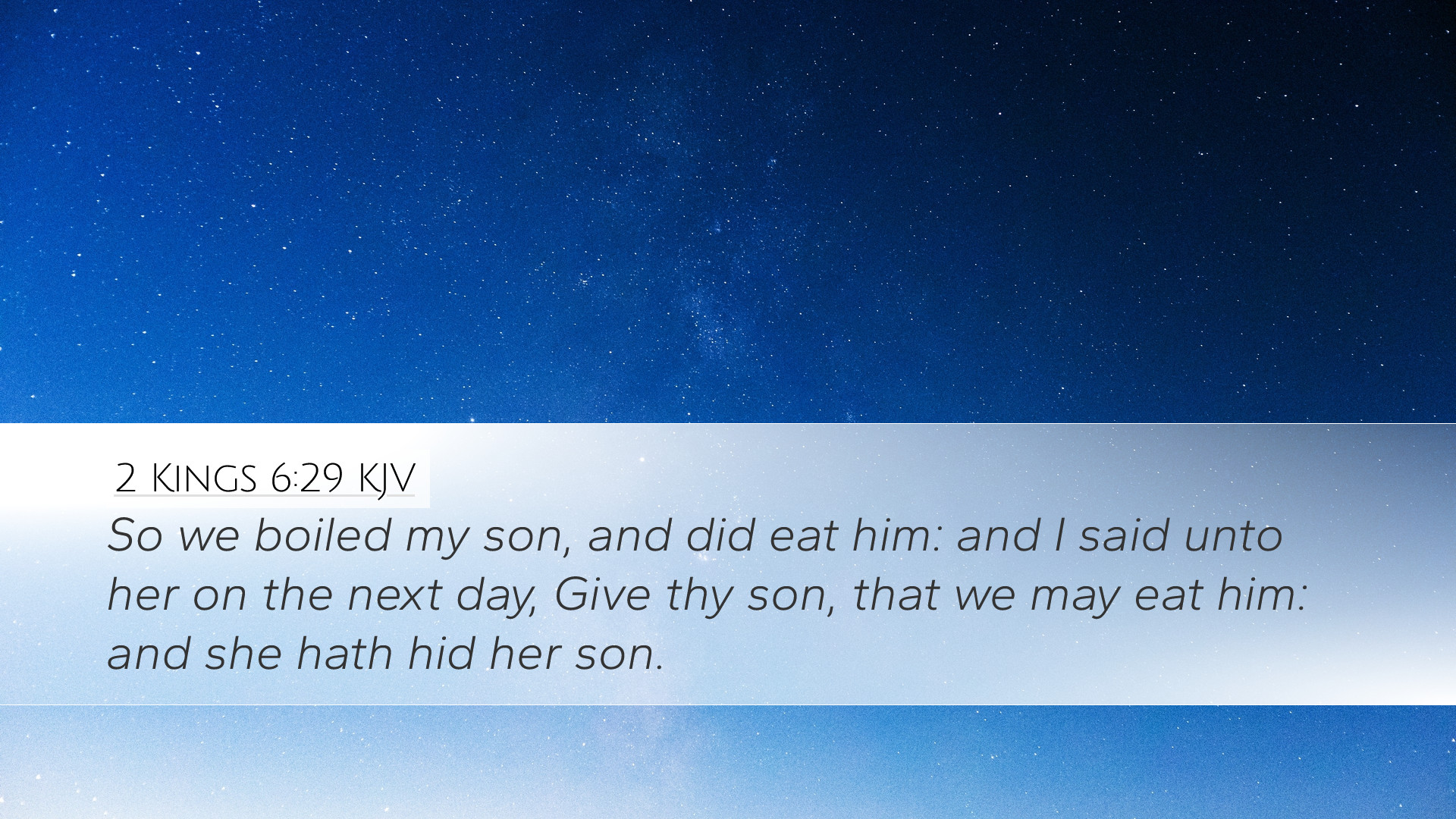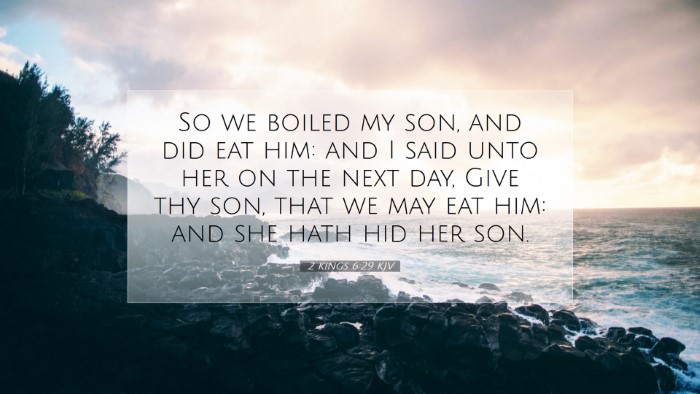Commentary on 2 Kings 6:29
Verse (2 Kings 6:29): "So we boiled my son, and did eat him: and I said unto her, give thy son, that we may eat him: and she hath hid her son."
Contextual Background
The narrative of 2 Kings 6 unfolds during a period of intense suffering in Samaria due to a devastating famine. The city was under siege by the Arameans, leading to a dire situation where food became exceedingly scarce. This context is crucial for understanding the extreme actions that were taken by the people, demonstrating the dire consequences of sin and the severe judgment of God upon a disobedient nation.
Insights from Matthew Henry
Matthew Henry reflects on the horror of the situation described in 2 Kings 6:29, emphasizing the depths of human depravity prompted by desperate circumstances. He notes that the act of cannibalism signifies the extreme nature of their plight and the breakdown of societal norms where love and compassion gave way to barbarity. Henry perceives this act as a culmination of the judgments against Israel, pointing out that it serves as a grim reminder of what can happen when a nation turns away from the ways of the Lord.
Additionally, Henry stresses the moral implications of such actions, highlighting that these events reveal the ultimate futility of relying on human provisions when God’s hand is against a people. He encapsulates the tragedy of the mothers involved, showcasing how desperation leads one to forsake even the most sacred bonds of love and duty.
Insights from Albert Barnes
Albert Barnes expounds on the societal and theological implications of this verse as well. He notes that the act of boiling and eating one’s child reflects not merely individual depravity but systemic failure within the society that led to such horrific choices. In his commentary, Barnes provides a parallel with how starvation can twist human beings' motivations and morality, turning benevolent human instincts into acts of monstrous survival.
Furthermore, Barnes connects this episode with the prophetic warnings given to Israel regarding their unfaithfulness. He suggests that the fulfillment of these tragic situations illustrates God’s efforts to bring His people back to repentance. Barnes expresses that the sorrow of the mothers serves as a poignant example of the consequences of national sin, leading to personal tragedies that resonate deeply within the community.
Insights from Adam Clarke
Adam Clarke’s commentary provides a detailed examination of the historical context and the actual events taking place. He notes the fierce famine in the city and explains cultural practices regarding eating during severe conditions. Clarke highlights how the act of cannibalism was unprecedented and further disturbed by the betrayal of trust between the two women, showcasing the total disintegration of community values.
Clarke also reflects on the broader implications of this narrative within the scriptural canon, emphasizing that such actions draw one closer to an understanding of the severity of sin against God. He encourages the reader to ponder the lessons about human nature and the fragility of societal structures when enduring extreme hardship and divine reproach. Clarke’s insight additionally points towards the necessity of spiritual remediation and repentance, urging a return to righteousness to avert divine judgment.
Theological Reflection
The horror depicted in 2 Kings 6:29 serves as a sobering call for reflection. It illustrates the extremes to which humanity can descend when distanced from divine truth and guidance. From the collective insights of these commentators, several theological themes emerge:
-
The Nature of Sin: The extreme actions of the mothers reflect how sin can corrupt and dehumanize individuals, leading to acts that are starkly contrary to the nature of God’s love and humanity’s dignity.
-
The Consequences of Disobedience: This narrative harshly underlines that when a nation forsakes God and His commandments, the consequences can be devastating, affecting not only the individual but the entire community.
-
The Importance of Community: The betrayal between the two women speaks to the breakdown of trust and community bonds in dire times, highlighting the necessity for love and mutual care even amidst struggle.
-
The Call to Repentance: Above all, the story serves as a warning for all believers about the need for consistent repentance and reliance on God, that He may spare us from devastation.
-
Hope in Despair: Even in the midst of judgment, the hope is that God’s mercy endures. This narrative, while grim, ultimately points to the necessity for redemption and restoration, a recurring theme throughout the Old Testament.
Conclusion
2 Kings 6:29 is a profound and disturbing verse that demands serious contemplation. The insights provided by Matthew Henry, Albert Barnes, and Adam Clarke encourage a deeper understanding of the human condition in the face of divine judgment. It serves as a reminder to contemporary audiences about the consequences of straying from God’s will and the hope that lies in returning to Him. Pastors, students, theologians, and Bible scholars are invited to extract lessons from this somber narrative to inform their understanding of sin, societal breakdown, and the enduring need for divine grace.


